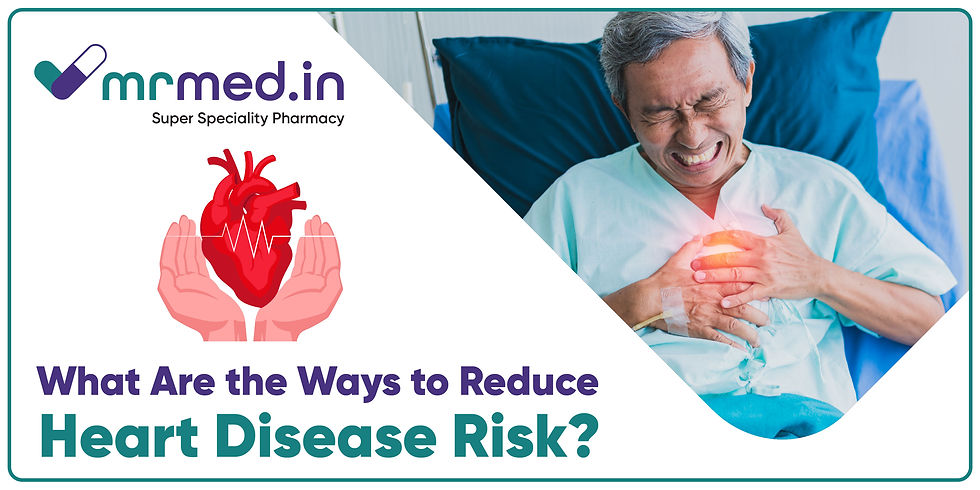What Are the Ways to Reduce Heart Disease Risk?
- Healthcare Tips

- Aug 27, 2024
- 3 min read

Heart disease is a major health concern, but there are many proactive steps that you can try to maintain a healthy heart and reduce your risk. By making changes in lifestyle and health management, you can significantly improve your heart’s well-being.
This blog will explore key strategies for lowering heart disease risk, recognising early signs of a heart attack, and offering practical tips for keeping your heart in shape.
What foods are best for heart health?
A nutrient-rich diet is the most effective way to enhance the heart's health. Try to include a variety of
Fruits
Veggies
whole grains
Lean proteins such as chicken breast, fish, lean beef, soy milk and tofu
Legumes
Omega 3 fatty acids rich food such as salmon, cod liver oil, flax and chia seeds, walnuts and soybeans.
Decreasing the consumption of trans and saturated fat foods, such as fried and junk food, can help manage blood pressure and cholesterol levels. Avoid excessive salt and sugar intake to maintain a healthy blood pressure and weight.
What are the activities to keep the heart healthy?
Regular physical activity can strengthen heart muscle and improve blood circulation, but it also helps manage weight and improves overall well-being. The American Heart Association recommends
Aim for at least 150 minutes of moderate-intensity aerobic activity each week, such as walking and cycling.
Strength training activities such as weight training and resistance training should be added at least twice a week.
Get up and move throughout the day, as anything is better than nothing. Even light-intensity training can keep the heart healthy.
Does body weight affect heart health?
Being obese can potentially increase the risk of developing heart disease. Being obese may increase the risk of developing high blood pressure, high cholesterol, and diabetes, which are key risk factors for heart health. Maintaining a healthy weight can be accomplished with a balanced diet and regular exercise, which are crucial for a healthy heart. The National Heart,
Lung and Blood Institute states that even losing 3 - 5% of your current weight can enhance blood pressure readings, lower bad LDL cholesterol, and improve good HDL cholesterol.
Is alcohol or smoking worse for your heart?
Smoking is known as the major risk factor for heart disease, which leads to the buildup of plaques in the arteries and escalates the risk of blood clots. Hence, quitting smoking can be one of the effective ways to improve heart health.
Excessive alcohol drinking can lead to high blood pressure and other cardiovascular issues. Decreasing alcohol intake can lower the risk of cardiac problems.
Does stress damage the heart?
Long-term stress can negatively impact the heart’s health by increasing blood pressure and contributing to unhealthy behaviours such as stress eating. Finding healthy stress management strategies, such as yoga, relaxation methods, and seeking support from friends and family, can improve heart health.
How Important Is It to Monitor and Manage Health Conditions?
Regularly check and manage any underlying health conditions that could increase the risk of heart disease. This includes:
High Blood Pressure: Keep it under control through diet, exercise, and medication if needed.
High Cholesterol: Regularly monitor cholesterol levels and follow your healthcare provider’s recommendations to manage them.
Diabetes: If you have diabetes, controlling blood sugar levels is crucial for heart health. Medications like Victoza 6mg Injection, which contains liraglutide, can be beneficial.
What are the five warning signs of heart disease?
Recognising early signs of heart attack can be lifesaving. Key signs to be aware of include:
Chest Pain or Discomfort: This can be felt along the front of your body, including the neck and upper abdomen.
Shortness of Breath: Blood accumulates in the veins that connect the heart and lungs because the heart is unable to pump blood. Fluid enters the lungs, producing shortness of breath.
Pain in Other Areas: Discomfort or pain that may spread to the jaw, neck, shoulder, or arms.
Coughing and wheezing: These do not go away and can be warning signs of fluid buildup in the lungs. You might also experience a cough with pink or red mucus.
Swelling in the arms, feet, or ankles: When the heart isn’t functioning properly, blood flow can become disturbed, leading to swelling in the lower legs and arms.
Wrapping up
Taking care of the heart requires a combination of prevention strategies, proper disease management, and early detection of signs and symptoms.
Certain lifestyle changes can help enhance cardiovascular health; these include participating in physical activities and eating healthy food. In people with diabetes, medications like Victoza 6mg Injection are quite useful in regulating the blood sugar level, and heart health has also been reported.
Regular check-ups with your doctor can help better prevent and treat heart health.
Comments